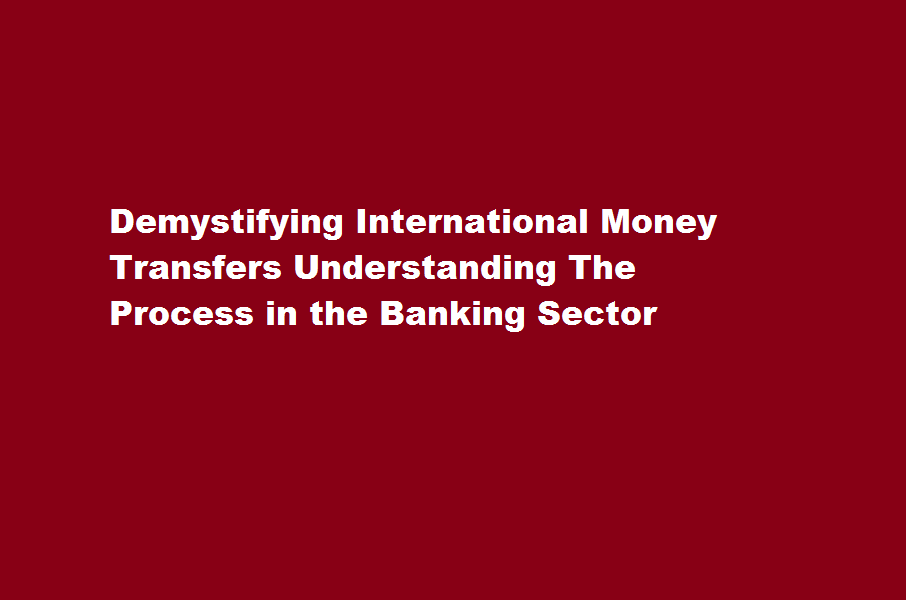Demystifying International Money Transfers Understanding The Process in the Banking Sector
4 min read
Introduction
International money transfers play a crucial role in today’s globalized economy, enabling individuals and businesses to send funds across borders securely and efficiently. In the banking sector, a well-defined process ensures the smooth transfer of money internationally. This article provides an in-depth understanding of how international money transfers work, shedding light on the steps involved, the role of intermediary banks, associated fees, and the methods available for seamless cross-border transactions.
Initiation of the Transfer
The process begins when an individual or business initiates an international money transfer request at their local bank. They provide the recipient’s details, including the beneficiary’s name, account number, and the destination country’s banking information. The sender also specifies the amount to be transferred and the desired currency for the recipient.
Compliance and Security Checks
Banks are required to comply with anti-money laundering (AML) and know your customer (KYC) regulations. As part of the process, the sender’s bank verifies the sender’s identity, the legitimacy of the transaction, and performs necessary security checks to prevent fraudulent activities and ensure compliance with regulatory requirements.
Routing through Intermediary Banks
In most cases, international money transfers involve one or more intermediary banks. These banks act as facilitators to transmit the funds from the sender’s bank to the recipient’s bank. Intermediary banks have correspondent relationships with banks in different countries, allowing them to process cross-border transactions efficiently.
Currency Conversion
If the sender initiates the transfer in a currency different from the recipient’s local currency, currency conversion takes place during the process. Banks use prevailing exchange rates to convert the funds from the sender’s currency to the recipient’s currency. Currency conversion fees may apply, and banks generally provide the sender with an estimated exchange rate and the final converted amount before completing the transaction.
Transaction Settlement
Once the funds reach the recipient’s bank, the transaction is settled by crediting the recipient’s account with the transferred amount. The recipient’s bank may apply fees for receiving international transfers, which can vary depending on the bank and the destination country. It is essential for the sender to provide accurate beneficiary details to ensure a smooth transfer and avoid any delays or issues.
Notification and Confirmation
Both the sender and recipient receive notifications and confirmations regarding the status of the international money transfer. The sender is notified when the funds have been successfully transferred, while the recipient is informed of the incoming transfer and its availability in their account. Banks often provide transaction reference numbers that can be used for tracking purposes and resolving any potential inquiries or discrepancies.
Timeline and Fees
The timeline for international money transfers can vary depending on factors such as the destination country, intermediary banks involved, and the selected transfer method. While some transfers can be completed within a few business days, others may take longer. Banks charge fees for international money transfers, which may include transaction fees, currency conversion fees, and fees imposed by intermediary banks.
Conclusion International money transfers are an integral part of the banking sector, facilitating seamless transactions across borders. By understanding the process involved, including compliance checks, intermediary bank involvement, currency conversion, settlement, and notifications, individuals and businesses can make informed decisions when initiating international transfers. It is crucial to consider factors such as fees, timelines, and the reliability of banking partners to ensure smooth and secure cross-border transactions in the globalized world.
Frequently Asked Questions (FAQs)
How long does an international money transfer typically take?
The timeline for international money transfers can vary depending on various factors, including the destination country, intermediary banks involved, and the selected transfer method. Some transfers can be completed within a few business days, while others may take longer.
What fees are associated with international money transfers?
Fees associated with international money transfers may include transaction fees, currency conversion fees, and fees imposed by intermediary banks. The exact fee structure can vary depending on the banks involved and the specific transfer details.
Are there any limits on the amount that can be transferred internationally?
Yes, banks often have limits on the amount that can be transferred internationally. These limits can vary based on the bank’s policies, the customer’s relationship with the bank, and regulatory requirements.
Read Also : Embracing The Future How Banks Can Adapt to The Rise of Digital Currencies and Cryptocurrencies






